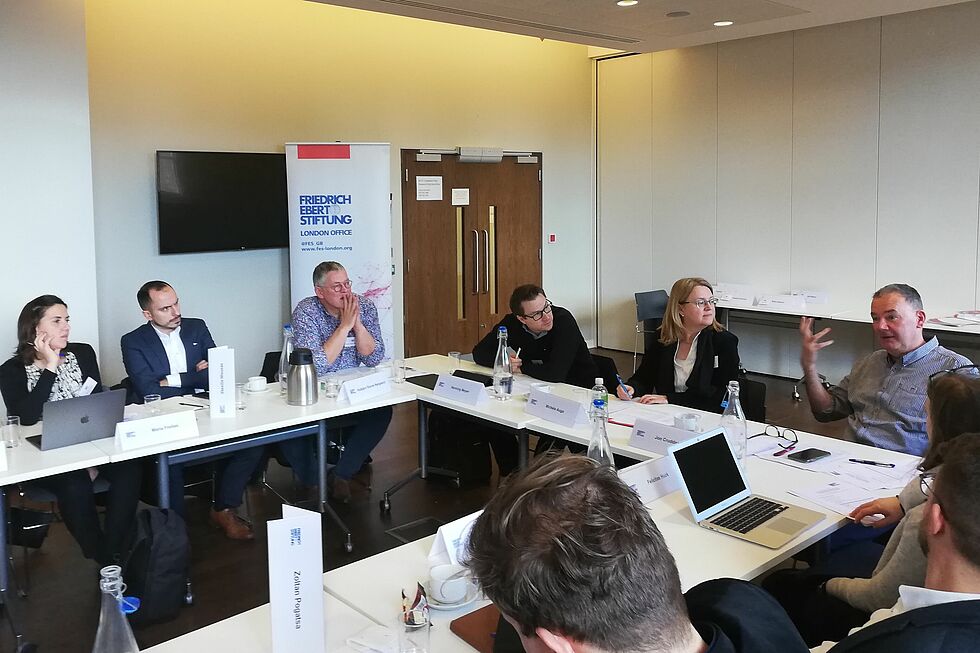Work, Economy & the Just Transition
Work, Economy & the Just Transition

The social democratic understanding of progress in the 21st century combines social, economic, and ecological responsibility. The power of automation, combined with the global threats posed by increasing inequality and climate change – two of the greatest present-day challenges – prompts us to rethink much of our economic, industrial, and social models. Hence, the Friedrich-Ebert-Stiftung is committed to a Just Transition – a socially and ecologically just structural change that enables sustainable economic activity, climate protection, and better life prospects for all.
FES UK strives to support both people and the economy for a Just Transition in the UK and Germany. We work with political and economic experts, international organisations, and trade unions to develop strategies and provide advice on how the UK and Germany can work together to achieve social justice and sustainability, especially in the aftermath of Brexit. In dialogue formats and publications, we develop approaches on how the EU and UK can successfully work together on climate and social policies. We need to safeguard and strengthen the welfare state, contribute to gender equality, and develop climate-neutral energy systems and industries.
Trade unions are at the forefront of the struggles for a democratic and sustainable world of work. International dialogue, policymaking, and strategising are essential to ensure effective workers’ representation. The Friedrich-Ebert-Stiftung works closely with workers, activists, and officials to promote stronger, more democratic, and more inclusive trade unions. In addition, our work in this area is supported by our Future of Work and Just Climate offices, both of which are located in Brussels and were founded in 2021. FES Future of Work aims to discuss and debate the future of work at the European level, and FES Just Climate focuses on energy, industrial, structural, and labour policies, as well as the European Green Deal.
Related Events
The Good Society – Strategic Positioning of the Left
What began as a bilateral exchange between leading representatives from Germany and the UK in 2008 has developed into a Europe-wide discussion on progressive issues over previous years, with regular meetings taking place ever since. Around ten years after the start of the project, 25 speakers from ten different countries discussed the Good Society project against the backdrop of a decade of profound change. In the 2020s progressive parties are still struggling with the aftermath of the 2008 financial crash as well as facing new challenges, such as digitisation, climate change, rising populism and increasingly polarised societies. The conference hence opened with a keynote speech and panel session taking stock of Building the Good Society by considering its foundations and values, and their relevance to these new challenges.
The second session was then devoted to discussing the role for the Good Society in times of transformation, with special regard to de-carbonisation and digitalisation. Questions included how to build trust and empower communities in areas affected by these transformations and whether the Good Society can offer a positive narrative of transformation.
The second day of the conference started with a discussion on the openness of the Good Society, including deliberations on immigration and the integration of new communities within the European society. The final panel session aimed at positioning social democracy in a polarized society and providing a future outlook for a successful reinvention of the European social democratic parties, for example, through building alliances with other progressive parties, movements, and citizens.
Related Publications
The Good Society – Strategic Positioning of the Left
What began as a bilateral exchange between leading representatives from Germany and the UK in 2008 has developed into a Europe-wide discussion on progressive issues over previous years, with regular meetings taking place ever since. Around ten years after the start of the project, 25 speakers from ten different countries discussed the Good Society project against the backdrop of a decade of profound change. In the 2020s progressive parties are still struggling with the aftermath of the 2008 financial crash as well as facing new challenges, such as digitisation, climate change, rising populism and increasingly polarised societies. The conference hence opened with a keynote speech and panel session taking stock of Building the Good Society by considering its foundations and values, and their relevance to these new challenges.
The second session was then devoted to discussing the role for the Good Society in times of transformation, with special regard to de-carbonisation and digitalisation. Questions included how to build trust and empower communities in areas affected by these transformations and whether the Good Society can offer a positive narrative of transformation.
The second day of the conference started with a discussion on the openness of the Good Society, including deliberations on immigration and the integration of new communities within the European society. The final panel session aimed at positioning social democracy in a polarized society and providing a future outlook for a successful reinvention of the European social democratic parties, for example, through building alliances with other progressive parties, movements, and citizens.



